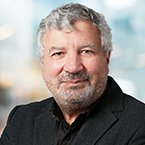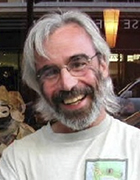
Alistair Cotton - Fotolia
Reducing poverty through fintech at the Bill and Melinda Gates Foundation
Kosta Peric swapped a life innovating for banks to work on increasing financial inclusion in the developing world
After a quarter of a century at the Society for Worldwide Interbank Financial Telecommunication (Swift), Kosta Peric decided to apply his expertise to helping the world’s poorest people access financial services.
Peric caught up with Computer Weekly at the recent Innovate Finance Summit in London, where he was presenting during a quick stopover between Africa and his office in Seattle.
Access to financial services can transform the lives of poor people across the world, and Peric is now helping to make this a reality through his blend of tech expertise, particularly financial technology (fintech) and financial services experience.
Peric, deputy director of financial services for the poor at the Bill & Melinda Gates Foundation, is a computer scientist by profession, and spent over 23 years working for Swift, where he began in 1990 as a research and development architect.
His last role at Swift was head of innovation in its Innotribe organisation, which innovates on behalf of the hundreds of banks that own it. He describes himself as a technologist at the intersection of technology and financial systems.
Swift, which is owned by banks, is a not-for-profit cooperative that provides a network through which financial transaction messages are sent.
It was set up in 1973 to enable banks to share communications infrastructures, and has added hundreds of banks and many new payment-related services over the years. It also provides a test bed for pilots using technology such as blockchain.
Swift network
Peric was the architect of the current Swift network, and first became interested in financial inclusion during his time heading up innovation in Swift’s Innotribe arm.
At that time, over a third of the world’s population was unbanked. “I started exploring this, connecting with people in that domain, as well as organisations like the Gates Foundation,” he said.
In 2013, that very organisation reached out to Peric as it was looking for someone with his mix of skills and experience – with fintech still a buzzword back then. “I decided to change and apply my skills to financial inclusion at the Gates Foundation,” he said.
His goal in his new role is to work with partners on the ground to help projects that provide financial products and services to the poor.
The Gates Foundation helps in several ways, with philanthropic capital, expertise and connecting people to share experiences. When it comes to providing financial services to poor people in developing countries, the key innovation is the emergence of mobile money.
Peric cited M-Pesa in Kenya and mCash in Bangladesh as notable examples of networks that connect people to financial services through even the most basic mobile phones.
Furthermore, these services are being run commercially, which means they can be sustained without external contributions. “These have proven it’s possible to serve even the poorest at a profit,” he said.
Today in Kenya, it’s possible to send money by simply sending a text message on a basic mobile phone.

“We are working on projects that connect mobile money systems together. When you interconnect different mobile money systems in a country or region, demand grows”
Kosta Peric, Gates Foundation
Peric said that of the 1.7 billion unbanked people in the world, over 90% have a simple mobile phone. The Gates Foundation helped a couple of the early projects – which acted as proofs of concept – and now there are many.
“Today, we are working on projects that interconnect all of these mobile money systems together,” he said. “When you interconnect different mobile money systems together in a country or region, demand grows.”
First, though, they need to integrate systems within countries. This way, people on different mobile money networks can connect and pay each other, and they are also connected to the traditional financial services organisations as well as merchants.
But building payment networks in some of the poorest regions of the world comes with major challenges. In fact, Peric said when working on projects at the Gates Foundation, teams have to be like water, because “it always finds its way around obstacles”.
For example, Peric said: “You need to be connected to a GSM tower, which can be a challenge in Africa because there are issues with electricity reach.”
Tanzania project
Peric is currently working on a project in Tanzania, which is using Mojaloop open source software developed by Ripple, Dwolla, ModusBox, Software Group and Crosslake Technologies for the Gates Foundation, as well as philanthropic capital and technical assistance.
“When this project is active in 2020, a woman with a mobile phone will be able to receive a salary payment, send money to other wallets, purchase things, pay bills and receive social security,” said Peric.
“If you think of that same woman today, she may have to travel a whole day to pay bills,” he said. “We know from research that this is hugely beneficial to people and is actually a poverty alleviation measure, which is why we are doing this in the first place.”
Farmers in the developing world are also a target group. Connection with mobile money helps them get paid for their produce, buy things like fertiliser and receive subsidies.
Simple mobile phones work with these systems, with some using text messages using USSD technology.
Significant progress has already been made. Peric said in Africa alone the mobile money projects the Gates Foundation has supported will enable 200 million people to connect. As well as the project in Tanzania, there is work being done in West Africa which involves eight countries.
It’s also working with mobile operator Orange on a project, beginning in West Africa, which plans to eventually be pan-African, and has a project in the south of the continent. Commercial partners do the work on the ground and they are making money, which is vital. “For them, this is not about charity but about scaling their business,” said Peric.
Commercial players
The money from the Gates Foundation de-risks projects and entices the commercial players to get involved.
“They may perceive a project as too risky, so we give them the opportunity to try, and when they see it works, they go on to fund it themselves because they realise it’s in their own interest,” said Peric.
“Through this approach, the Gates Foundation hopes to be instrumental in connecting all of the 400 million adults in Africa.”
Beyond Africa, the organisation is involved in projects in Pakistan and India, and is also working with credit unions in Southeast Asia.
Providing financial services for the poor is just one of 28 different strategies at the Gates Foundation, many of which are focused on health.
But how does Peric feel about life outside banking? “I am very lucky to have found a domain where not only can I contribute with my skills, but also have a huge impact on enabling poverty alleviation,” he said. “It’s an amazing experience.”
Read more about the Gates Foundation
- Mobile banking can help the poor change their lives and two billion people who don’t have bank accounts store money by phone by 2030.
- Charity set up by Microsoft founder Bill Gates adopts Salesforce solution to monitor and react to social media.











